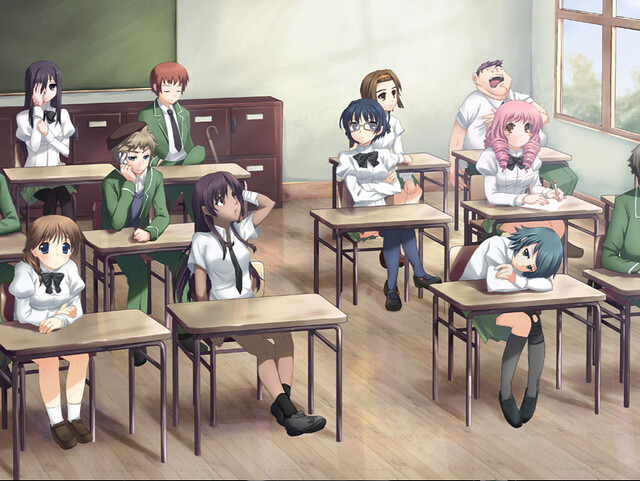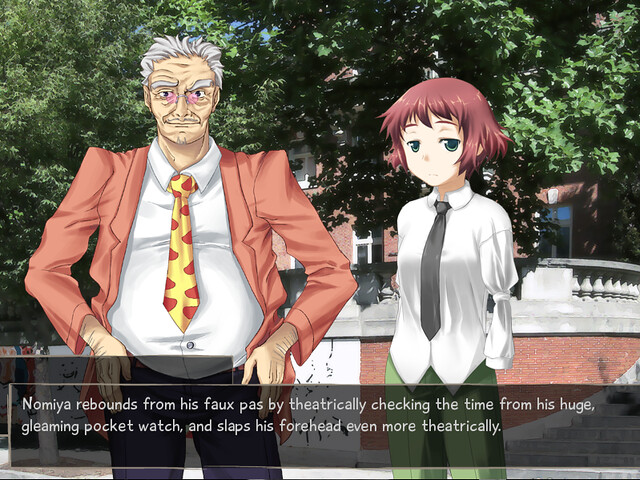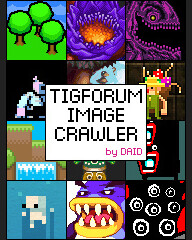Review: Katawa Shoujo
By: Derek Yu
On: February 8th, 2012
[This is a guest review by Tof Eklund.]

“Everyone wants someone there to pull them up, out of their self-pity.” -Hisao Nakai
Katawa Shoujo is a visual novel that takes place at a school for the disabled. The game’s protagonist, Hisao, arrives there reluctantly after a long hospital stay for life-threatening arrhythmia (irregular heartbeat). His first episode occurred when a girl at his school confessed to him, setting the tone of heartbreak, isolation, and the difficulty of human connection for the game. Thus the game’s logo, a yellow heart criss-crossed with bandages: wounded and frightened.
This is a relationship/dating sim game, but it is closer in feel to Evangelion than any of the “harem” anime and manga (Tenchi Muyo, Love Hina) that it may seem, on casual inspection, to resemble. Each of the girls that Hisao can wind up falling in love with at Yamaku Academy has a different disability, and that, combined with the fact that there is (semi-)explicit sex in this game, is the reason some people have dismissed it, unplayed, as a fetish-fest.
The thing is, though Katawa Shoujo is painstakingly detailed and accurate in its representation of different forms of disability, it isn’t about disability. Hisao is the only character in the story who is learning to live with and accept his handicap. None of the girls in the game need or want a helper or caretaker. The first thing that Hisao, and the player, starts to see is that the people around him aren’t charity cases. Each one lives with their disability, taking blindness or armlessness the same way you or I take the fact that we can’t fly – when was the last time you worried about that?
There is an exception: a nearly-blind social phobic (hikkikomori) named Kenji who lives across the hall from Hisao. He alone, out of all the characters, has completely failed to adapt, and lives a small, pathetic life of isolated paranoia, characterized by extreme gynophobia. Kenji is a kind of dark and distorted mirror of what Hisao could become if he lets himself wallow in his own misery.
The real challenge in the game – and it is a challenge – is emotional trauma. If Katawa Shoujo has an underlying theme, it is that we are all disabled and “normal” alike, walking wounded. Even the teachers at Yamaku Academy (who are, as far as we can tell, not disabled) show some emotional scarring. The name of the game is “the hedgehog’s dilemma”. Sometimes the “obvious” decision, an attempt to get closer, pushes the other character away.
If you treat other characters as invalids to be taken care of or broken dolls that Hisao must “fix”, you won’t get far in Katawa Shoujo.
For all its strengths, Katawa Shoujo is still prone to the flaws common to visual novels, like decision points where reasonable actions are not available and occasionally some lack of clarity about where a single choice will lead the conversation or action. In many visual novels, choices are either head-smackingly obvious or impossibly vague. This is especially true of games translated from Japanese, where differences in degree of politeness are hard to convey. In Katawa Shoujo (which was written in English), the choices generally feel credible, and decisions are usually made difficult by apparent tradeoffs between options rather than lack of clarity about what the options are. Some choices yield fairly clear and immediate consequences, but many take time to play out, increasing suspense and replayability.
There is sex in this game, and it’s an important part of the game. There is a general division of dating sims (visual novel or otherwise) into “sex” and “no sex” games, with the former group often making sex the goal of the game, in the vein of “sow wild oats, then (maybe) pick which girl to settle down with”. I think it’s inevitable that the sex in Katawa Shoujo will act as a “carrot”, a part of players’ interest in the game, and I don’t think that’s a bad thing. What’s interesting, then, is that sex is also depicted realistically in the game. Sex isn’t a cure-all. In the game, it sometimes deepens intimacy or releases tension, but it can also really mess things up.
Most interestingly, it can even be desired and appropriate, but go poorly. There is one scene in the game that involves poorly-informed experimentation with anal sex. Rather than succumb to the porn-industry cliche that the only thing better than vaginal is anal, this scene leads to a much more likely conclusion: both characters vow to “never do that again.”
There is an option in the menu to skip the game’s adult content, a key design decision. Four Leaf Studios clearly recognized that there are people who would want to play this game but would be put off by the graphic sexuality. This self-censorship, when enabled, is crude but functional. There is still sex in the game, and it is obvious when it happens, but it happens offscreen. To be clear, images with nudity and/or sex acts are skipped, as is the most explicit text, but there is still sexually suggestive content in that mode of the game.
However, there is no option to “lock out” the adult content. This is consistent with the developers’ 4chan origins: you don’t have to see things you don’t want to, but other people have a right to. The lack of an option to lock out the adult content means, for example, that a parent who thinks the expurgated version of the game might be appropriate for a young adult would have to trust their child not to turn the sex back on.
That’s my one complaint about the game: the no-sex version of Katawa Shoujo could be appropriate for tween/teen audiences, and maybe even educational use, but that won’t happen when the adult content is just a click away.
-
Guest
-
Jon
-
News
-
http://twitter.com/phubans Paul Hubans
-
Firepith
-
Lark
-
westley
-
Piotr
-
Anonymous
-
OMG
-
Brian Westley
-
Patter
-
Guest
-
Austen_durham
-
Anonymouse
-
What
-
westley
-
welp
-
Cypress_dahlia
-
Sine
-
Sine
-
Sine
-
LeavingCommentsTheGame
-
Anonymous
-
Brian Westley
-
Guestimus Prime
-
Vincent
-
http://profiles.google.com/negispringfieldczar Greg Morton
-
Asdf
-
Guest
-
Kelly Miller
-
Tof Eklund
-
Katawa Flamewars 2012!
-
Quazi
-
Paimun
-
Paimun
-
Paimun
-
Paimun
-
Super
-
coolfaggot
-
Sebastian
-
Anon
-
Rejectjohn
-
Mateus
-
ur a faget
-
Spencer Trace
-
http://freegameslist.weebly.com/ TheMan
-
Charlie G. Pierce
-
[email protected]


